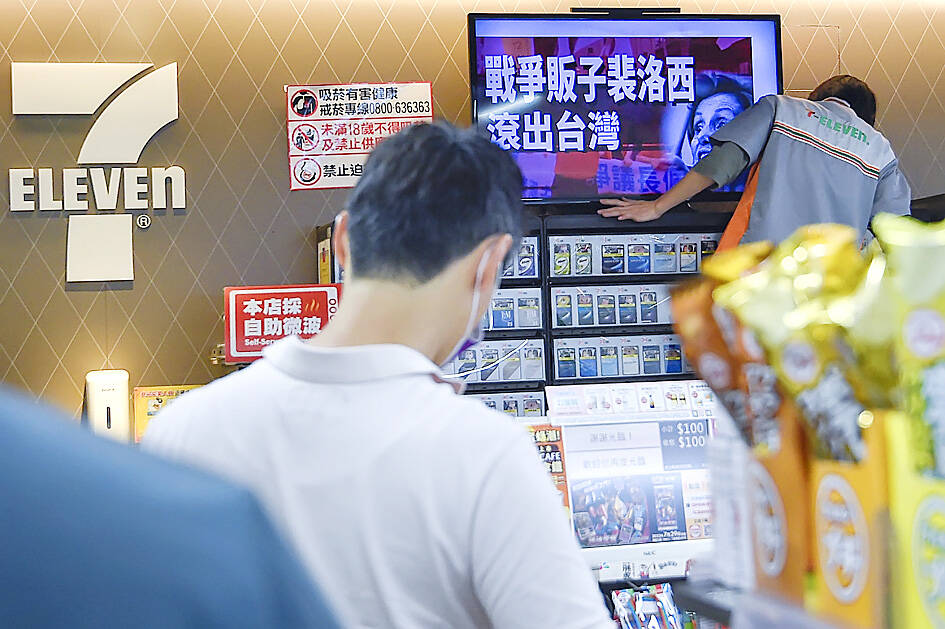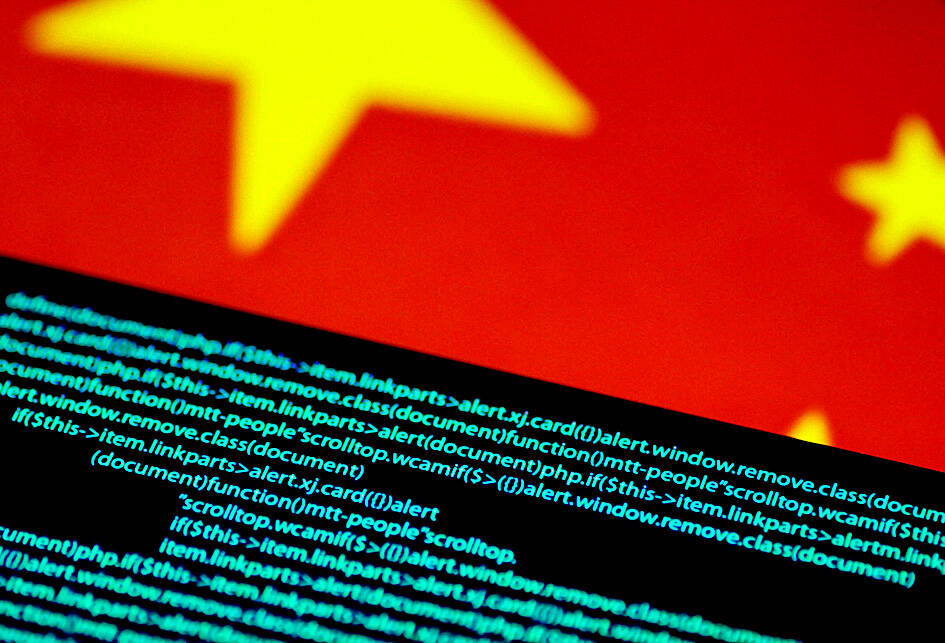The Executive Yuan is drafting regulations to tighten rules and protocols restricting the use of China-made telecom hardware and software by government agencies that could undermine national security, sources said.
For Taiwanese missions in countries where there is no alternative other than to use China-made products, the proposed measures would require that the agencies first pass two security checks — one by the government agency’s information security section head and a second by a higher level agency’s information security head, the sources said.
They would then have to file an application for approval by the Ministry of Digital Affairs, stating their reasons and conditions for using such products, with the information fed into a database on government special procurement programs for monitoring, the sources said.

Photo: Chen Chih-chu, Taipei Times
The additional safeguards are aimed at enhancing scrutiny to alert information security heads and patch vulnerabilities to prevent leaks and Chinese cyberattacks, they said.
During US House of Representatives Speaker Pelosi’s visit in early August, malicious messages against Pelosi were run on a southern Taiwan railway station’s digital billboard, which was rented to a contractor whose China-made operating software was hacked, prompting the Executive Yuan to undertake remedial action to patch the vulnerability.
The digital ministry, as the agency in charge of information security, has proposed stronger restrictions and enforcement of rules against the use of China-made telecom hardware and software by amending the “Principles on limiting the use by government agencies of products that harm national information security.”

Photo: Reuters
The proposed restrictions would include digital billboards and video displays rented to private contractors of Taiwanese railways and other state-affiliated enterprises and public sector agencies.
The ministry has posted a preview of the proposed amendments, now under review by the Executive Yuan’s Legal Affairs Committee, before the Executive Yuan is to officially issue an administrative order for their enforcement.
The main articles include an explicit ban against the use of China-made telecom products, including surveillance cameras, by government agencies and their contracted public-use sites, and would be incorporated into business agreement for companies renting the sites for use.
In related news, in response to allegations that a contractor from which Taiwan’s armed forces purchased bulletproof vests in 2018 might have used fabric from China instead of Taiwan, Tung Chung-hsing (董中興), deputy head of the Ministry of National Defense’s Department of Resource Planning, yesterday said that the armed forces had terminated the contract and handed the case over to the judiciary.
The armed forces are conducting checks on other contractors to see whether they have any links to China or Chinese funding, Tung said, adding that the fabric used in making bulletproof vests would be listed as one of the regulated military materials.
Additional reporting by Aaron Tu and Jason Pan

CHAOS: Iranians took to the streets playing celebratory music after reports of Khamenei’s death on Saturday, while mourners also gathered in Tehran yesterday Iranian Supreme Leader Ayatollah Ali Khamenei was killed in a major attack on Iran launched by Israel and the US, throwing the future of the Islamic republic into doubt and raising the risk of regional instability. Iranian state television and the state-run IRNA news agency announced the 86-year-old’s death early yesterday. US President Donald Trump said it gave Iranians their “greatest chance” to “take back” their country. The announcements came after a joint US and Israeli aerial bombardment that targeted Iranian military and governmental sites. Trump said the “heavy and pinpoint bombing” would continue through the week or as long

TRUST: The KMT said it respected the US’ timing and considerations, and hoped it would continue to honor its commitments to helping Taiwan bolster its defenses and deterrence US President Donald Trump is delaying a multibillion-dollar arms sale to Taiwan to ensure his visit to Beijing is successful, a New York Times report said. The weapons sales package has stalled in the US Department of State, the report said, citing US officials it did not identify. The White House has told agencies not to push forward ahead of Trump’s meeting with Chinese President Xi Jinping (習近平), it said. The two last month held a phone call to discuss trade and geopolitical flashpoints ahead of the summit. Xi raised the Taiwan issue and urged the US to handle arms sales to

BIG SPENDERS: Foreign investors bought the most Taiwan equities since 2005, signaling confidence that an AI boom would continue to benefit chipmakers Taiwan Semiconductor Manufacturing Co’s (TSMC, 台積電) market capitalization swelled to US$2 trillion for the first time following a 4.25 percent rally in its American depositary receipts (ADR) overnight, putting the world’s biggest contract chipmaker sixth on the list of the world’s biggest companies by market capitalization, just behind Amazon.com Inc. The site CompaniesMarketcap.com ranked TSMC ahead of Saudi Aramco and Meta Platforms Inc. The Taiwanese company’s ADRs on Tuesday surged to US$385.75 on the New York Stock Exchange, as strong demand for artificial intelligence (AI) applications led to chip supply constraints and boost revenue growth to record-breaking levels. Each TSMC ADR represents

State-run CPC Corp, Taiwan (CPC, 台灣中油) yesterday said that it had confirmed on Saturday night with its liquefied natural gas (LNG) and crude oil suppliers that shipments are proceeding as scheduled and that domestic supplies remain unaffected. The CPC yesterday announced the gasoline and diesel prices will rise by NT$0.2 and NT$0.4 per liter, respectively, starting Monday, citing Middle East tensions and blizzards in the eastern United States. CPC also iterated it has been reducing the proportion of crude oil imports from the Middle East and diversifying its supply sources in the past few years in response to geopolitical risks, expanding